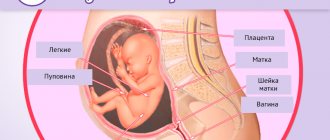IN THIS ARTICLE:
- Why is pregnancy sickness called “morning sickness” if you feel sick all day?
- When does toxicosis begin and end during pregnancy?
- Is it normal for morning sickness to persist for 9 months?
- Why do almost all pregnant women have toxicosis in the first trimester?
- Can toxicosis have individual differences in different women?
- Why do pregnant women have toxicosis and is this a good sign?
- How to get rid of toxicosis in a pregnant woman?
- What should I do if vomiting prevents me from eating normally?
Surely you were happy when you threw up for the first time - after all, this is a sure sign of pregnancy! However, what to do with nausea if it bothers you every day and makes it impossible to eat normally? How intense can toxicosis be in pregnant women and how long can it last? How can morning sickness affect a child? If all these questions are swarming in your head, look for answers to them in the article below. In it you will find 22 safe recommendations for combating toxicosis, which more than one generation of mothers has tested on themselves.
Shall we get started?
Why is pregnancy sickness called “morning sickness” if you feel sick all day?
“Morning sickness” and “pregnancy sickness” are terms that can be somewhat misleading. After all, morning sickness does not actually always occur in the morning, but can last throughout the day or appear only after eating. As for toxicosis, in its literal sense this term means acute intoxication of the body. During pregnancy, no intoxication occurs, although the symptoms of toxicosis in pregnant women are very similar to acute poisoning.
So what is the correct name for this condition?
In medicine, it is referred to as “toxicosis of pregnancy.” It is worth immediately noting that the intensity of various manifestations of morning sickness can vary greatly from woman to woman. For example, about 75% of all pregnant women experience nausea and vomiting during the first trimester, while the rest may only suffer from vomiting.
However, even the mildest bout of morning sickness can have a huge impact on your well-being, not to mention round-the-clock bouts of vomiting, which can leave you feeling terribly exhausted and miserable. Therefore, be sure to discuss your condition with a gynecologist and ask for his advice on how to cope with the symptoms of pregnancy toxicosis.
If you need help right now, continue reading this article.
Who is at risk?
The exact causes of this condition and the mechanism of its occurrence in pregnant women are not fully understood. In this regard, it is impossible to reliably name the group of patients who are more or less threatened by this condition. Scientists suggest that toxicosis is more likely to occur under the following circumstances:
- If the mother is under 18 or after 35 years of age.
- In patients with impaired renal function.
- In the presence of endocrine or immune diseases.
- For mothers whose first pregnancy occurred with nausea, vomiting and dizziness.
- In the presence of gynecological diseases, in particular, inflammation of the endometrium, severe toxicosis can occur.
- In women suffering from alcohol addiction.
- In the presence of latent anemia.
You might be interested in: Is it possible to cut your hair during pregnancy?
This is just a short list of prerequisites for the development of the condition in question. Negative symptoms can occur in a pregnant woman in the morning, afternoon, evening or night. To prevent various complications, the expectant mother is required to register with a doctor.
The leading gynecologist will definitely find out how the previous pregnancy proceeded, whether close relatives had difficulties with bearing children and other features.
When does toxicosis begin and end during pregnancy?
Usually, the first attacks of nausea in pregnant women begin at the 6th week of pregnancy, and in very rare cases they can appear as early as the 4th week. After the first signs of toxicosis, your health will only worsen. Such torment can last about a month.

When will toxicosis go away in a pregnant woman?
In approximately 50% of all pregnant women, their health begins to improve by the end of the first trimester, that is, at 13-14 weeks.
As for the remaining half of expectant mothers, some symptoms of pregnancy toxicosis may persist for about another month. In this case, periodic attacks of malaise may return later, or appear periodically throughout pregnancy.
Folk remedies
Recipes based on the use of natural products help you survive a difficult period. Folk remedies should be taken only after consulting a doctor, as they can cause some negative consequences.

So, let's look at popular recipes:
- Peppermint oil. Aromatherapy was used by our ancestors in Ancient Greece, Rome and Rus'. A few drops of this product can be added to water and placed in front of you by your bed in the morning. This will help get rid of nausea and dizziness.
- Ginger oil also helps eliminate vomiting. It can be applied to the palms and rubbed well. If attacks of nausea occur frequently, you can carry a bottle of oil in your purse.
- Lemon tea. This is another proven remedy that helps relieve morning sickness. You can use weak black or green tea. Just add a slice of lemon to it and drink it warm.
- Cranberry juice. This healthy drink will not only help relieve an attack of lightheadedness, but also saturate the body with useful vitamins. You can drink it several times a day.
- Tea with mint leaves. This drink helps cope with illness, eliminates dizziness, and relieves nausea. You can buy mint at the market or grow it yourself.
- Chamomile and sage decoction. Herbs are taken one teaspoon per 500 ml of water. The raw materials are poured with boiling water and left to brew for 40 minutes. You need to drink a quarter glass of the decoction 2-3 times a day.
- Ginger. The root of this plant is excellent in relieving unpleasant symptoms. You can cut it into pieces and inhale the aroma or add it to tea.
You might be interested in: 41 weeks pregnant and still not going into labor
Before using natural oils, you should make sure that you are not allergic to them. You can do a simple test to do this. Apply a small amount of product to your wrist and leave it for 15 minutes. If there is no irritation or redness, you can safely use the oil.
Is it normal for morning sickness to persist for 9 months?
This is very unusual, but for some pregnant women, it may be normal for toxicosis to persist in the second and third trimester.
However, your doctor should definitely be aware of this feature. After all, if morning sickness is too intense and severe, it can cause dehydration, deficiency of nutrients necessary for the development of the child, and the inability to gain the necessary weight. In addition, it is important to make sure that the cause of toxicosis is indeed pregnancy.
Why do almost all pregnant women have toxicosis in the first trimester?
There is no exact and unambiguous answer to this question.
Most likely, morning sickness in pregnancy is a combination of many physical changes that occur in the body of the expectant mother. The most obvious causes of toxicosis in a pregnant woman are:
- Human chorionic gonadotropin (hCG) or “pregnancy hormone” . This hormone appears in the body of a pregnant woman after conception and during the first trimester its amount continues to increase. There is no explanation as to how exactly hCG provokes morning sickness, but it is known for sure that the deterioration of the expectant mother’s condition is directly related to an increase in the amount of this hormone. In addition, when the amount of hCG increases in the case of a multiple pregnancy, the manifestations of toxicosis also increase.
- Estrogen . Along with other hormones, estrogen is also one of the possible causes of morning sickness. Indeed, in the early stages of pregnancy, its amount also increases very intensively.
- Increased sensitivity to different odors . Almost all expectant mothers note that during pregnancy their sense of smell becomes very acute, and therefore they begin to notice more odors, which can provoke unexpected bouts of vomiting. According to the researchers, increased sensitivity to odors is also associated with increased estrogen levels.
- Gastrointestinal susceptibility . Scientists also believe that in some women, nausea may be triggered solely by the sensitivity of their stomach. In addition, some studies have established a relationship between the presence of Helicobacter pylori bacteria in the stomach of a pregnant woman and more frequent manifestations of ailments. However, such interconnectedness is not always observed.
- Stress . Because some women experience vomiting and nausea as a way of responding to stressful situations, scientists speculate that morning sickness may be the body's way of coping with unconscious anxiety about pregnancy. However, there is no real evidence for this theory. And stress often causes illness itself rather than pregnancy.
When does it start and how long does it last?
To date, the true factors that provoke toxicosis have not been fully studied. The reaction of the female body to pregnancy remains largely unclear to scientists. The main theory explaining the origin of the condition in question is immune. In simple words, the immune system cannot understand why it is impossible to destroy a foreign organism that develops in the womb of a woman.
After fertilization of the egg by the sperm, active production of the hormone progesterone begins. Thanks to it, the reproductive organ is prepared for implantation, and nutritional components and fats accumulate in the pregnant woman’s body. The immune system recognizes only the father's genetic material as a foreign organism. Women's genes are considered native.

To prevent the immune system from destroying the embryo, progesterone suppresses it. It is believed that in mothers with strong natural defenses, toxicosis is always more pronounced, since their immunity does not give up until the last moment. During the process of suppressing a woman’s body’s defenses, various biochemical changes occur, which leads to internal intoxication.
You may be interested in: Ultrasound of the pelvic organs - on what day of the cycle is it done?
First manifestations
Based on the above information, the first manifestations of toxicosis can begin immediately after fertilization. The introduction of a fertilized egg into the wall of the uterus occurs approximately on the 7th-8th day. Immediately after this, the production of another substance begins, namely human chorionic gonadotropin, which is designated by the abbreviation hCG. This substance also specifically affects a woman’s well-being. HCG accumulates slowly in the body, so the first signs of intoxication may develop in about a week, that is, approximately by the date when the girl is expecting her next period. Clear signs of toxicosis, according to medical statistics, usually appear 5-6 weeks after conception, less often 3-4 weeks after fertilization.
How long does it last?
If we talk about how long this unpleasant condition can last for mommy, even the most experienced doctor is unlikely to be able to give an accurate answer. Here a lot depends on the individual characteristics of the organism. According to many experts, toxicosis often lasts up to 14-16 weeks. Reviews from mothers indicate that they began to experience relief after approximately 12-14 weeks. Less often, negative signs persist until 18-21 weeks.

In the morning, the level of sugar in the body is much lower than in the afternoon. In this regard, discomfort in pregnant girls most often occurs in the morning. Despite this, the signs of this condition persist throughout the day in many women.
The severity of toxicosis is also determined using laboratory tests. They help identify the level of acetone in the urine and other disorders.
Can toxicosis have individual differences in different women?
Of course. However, if you suffer from very intense morning sickness, the reason may be hidden in:
- The presence of multiple pregnancies - twins, triplets or more. Due to the development of a large number of fetuses, your body will produce more hCG, estrogen and other hormones. All this can provoke more severe manifestations of toxicosis. But this rule is not confirmed in all cases - some women experience virtually no illness while carrying twins, or they have no toxicosis at all.
- Tendency to frequent headaches and migraines.
- Pregnancy with a girl. According to research, in 55% of cases, women who had severe toxicosis during pregnancy became mothers of girls.
Can toxicosis affect a child?
Mild to moderate nausea with occasional vomiting will not affect your baby's development. Even if morning sickness prevents you from gaining the required amount of weight in the first trimester, this is usually not a problem. The main thing is that your body does not experience dehydration and, despite vomiting, receives the necessary nutrients. After the morning sickness of the first trimester, your appetite will definitely return and you will begin to gain weight.

If morning sickness prevents you from eating a balanced diet, be sure to take prenatal vitamins. They will help you maintain healthy levels of nutrients in your body.
But if you are faced with very severe and intense attacks of vomiting, then in this case there is indeed a reason for alarm. This reaction of the mother's body to the child can cause premature birth and the birth of a low-weight baby.
But if during your entire pregnancy you still manage to gain at least 7 kg, with a high probability you will be able to carry your baby to the planned due date, and he will be born absolutely healthy.
Why do pregnant women have toxicosis and is this a good sign?
Although it is counterintuitive, in many cases morning sickness indicates a healthy pregnancy. However, some studies show that pregnant women with minor manifestations of toxicosis are more likely to experience miscarriage. This pattern can be explained very simply: if your baby or placenta is not developing properly, the level of hormones in your body will remain at the same level. And since it is precisely due to an increase in hormonal levels that nausea develops, it will not occur if there is a threat of miscarriage.
But don't panic if you're pregnant and don't feel sick!
Many women have never experienced toxicosis during healthy pregnancies. So in this case, you can consider yourself the luckiest mommy and calmly prepare for the arrival of your little one.
What should I do if vomiting prevents me from eating normally?
If you have severe morning sickness during pregnancy and are unable to eat anything (even drink water, juice, or take vitamins and medications), you may develop a condition called hyperemesis gravidarum. In this case, you will need mandatory hospitalization (but not necessarily long-term) and treatment with IVs.
Be sure to consult a doctor if:
- you lose more than 1 kg per day;
- nausea and vomiting began after 9 weeks of pregnancy;
- symptoms of toxicosis persist even after 20 weeks of pregnancy;
- vomiting is accompanied by blood;
- when you try to get up, you start to feel dizzy;
- you have signs of dehydration, such as infrequent trips to the toilet and dark-colored urine;
- you feel abdominal pain, fever, headache, or swollen lymph nodes in your neck.
Conclusion
No matter how scary morning sickness may seem to you, you can and should fight them. First of all, try to prepare in advance for such manifestations of pregnancy and ask your doctor to prescribe safe medications for you. Perhaps there will be no need for them, but if other methods of combating toxicosis of pregnancy do not help you, you will always have a reliable remedy at hand. Also, do not forget to imagine your baby as often as possible - focusing on thoughts is also an effective way to combat nausea.
Did our tips help?
Be sure to like this article and tell your friends about it! Perhaps they are also interested in questions to which you have already received answers.
Signs of toxicosis
Many women consider nausea accompanied by vomiting to be the main sign of toxicosis. It is on this basis that gynecologists diagnose toxicosis in the early stages of pregnancy. Toxicosis may be mild, accompanied by mild nausea and vomiting several times a day. Toxicosis can be moderate, constant nausea accompanied by vomiting up to 10 times during the day. And toxicosis can be severe, constant nausea and vomiting up to 25 times a day.
Against the background of nausea and vomiting, there is also weight loss of 3 kilograms or more, weakness, headaches, increased fatigue, irritability, as well as a general deterioration in health, which will be reflected in a decrease in hemoglobin in the blood, pressure surges and the release of harmful toxins into the body. You will feel very bad. You will have no appetite, and you will not feel the desire to get out of bed either, since only by taking a horizontal position on an empty stomach will you be able to rest normally.
Your stomach will rebel even from a sip of water, and looking at the food, you will nostalgically remember how you calmly ate fried cutlets or a cake. Of course, many will feel sorry for themselves, since during this period the psyche is very unstable and women are prone to frequent tears or simply attacks of bad mood. Naturally, your loved ones will reassure you that you need to be patient for the sake of the child you don’t feel yet, and the only sign of a long-awaited pregnancy is endless nausea.









